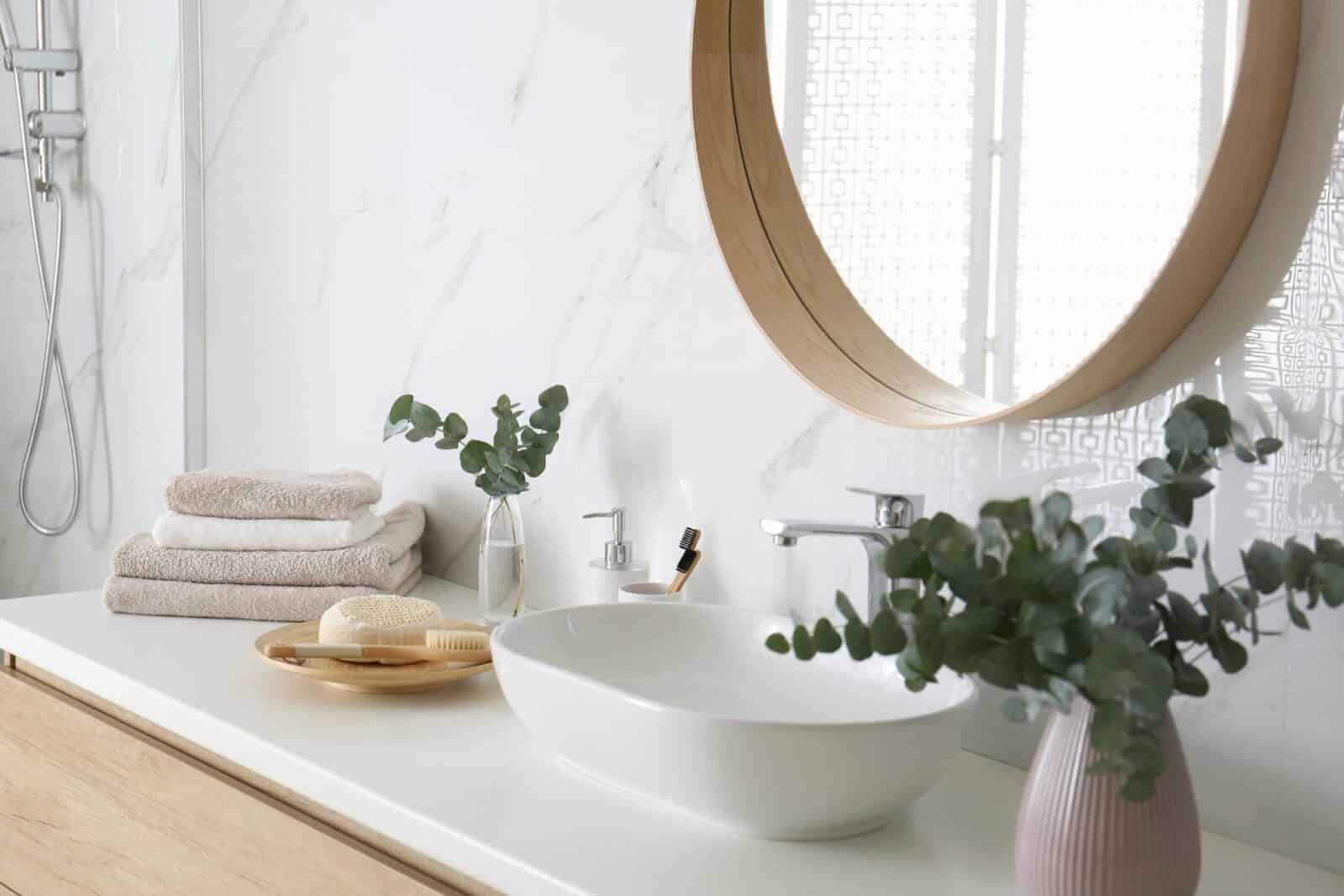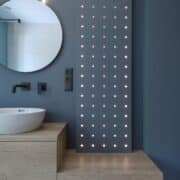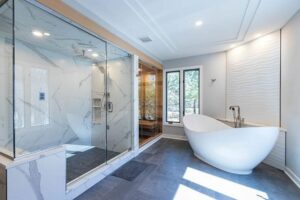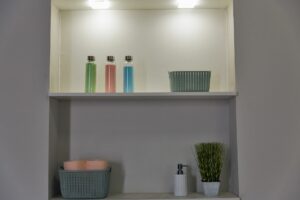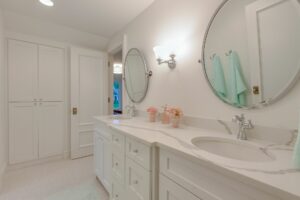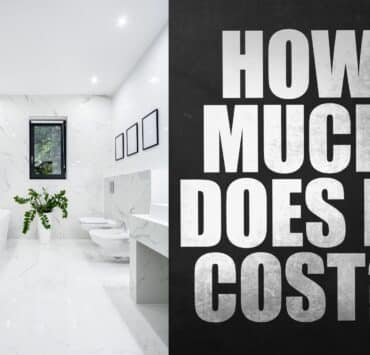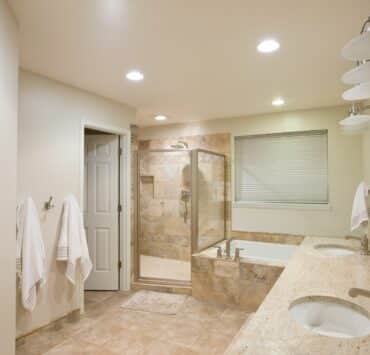Bathroom countertops play a crucial role in both functionality and aesthetics. They need to withstand daily wear and tear while contributing to the overall design of the space. With a plethora of materials available, each boasting its unique set of features, it’s important to weigh the pros and cons before making a decision. In this article, we will delve into the advantages and disadvantages of some popular bathroom countertop materials, supplemented with informative tables for easy comparison.
1. Granite:
Granite is a popular natural stone choice as a bathroom countertopmaterials due to its remarkable durability and stunning visual appeal. This igneous rock is formed from cooled magma and boasts exceptional resistance to heat, scratches, and impacts, making it an excellent option for high-traffic bathrooms. The natural veining and color variations in granite lend a touch of uniqueness to each countertop, enhancing the overall aesthetic of the space. While requiring occasional sealing to prevent staining, granite’s relatively low maintenance needs make it a sought-after choice for those looking for a blend of functionality and elegance.
Pros:
| Advantages | Details |
|---|---|
| 1. Durability | Granite is highly durable and can withstand heat, scratches, and impacts. |
| 2. Aesthetic Appeal | It offers a natural, elegant look with unique veining and color options. |
| 3. Resale Value | Granite countertops can increase the value of your home due to their desirability. |
| 4. Low Maintenance | Sealing can make it resistant to stains, and regular cleaning is relatively easy. |
Cons:
| Disadvantages | Details |
|---|---|
| 1. Porosity | If not properly sealed, granite can absorb liquids, leading to staining and bacterial growth. |
| 2. Maintenance | While generally low-maintenance, periodic resealing is necessary to maintain its performance. |
| 3. Cost | Granite countertops tend to be on the pricier side, including installation costs. |
| 4. Weight | Its heavy weight may require additional support, especially in older homes. |
2. Marble
Marble is synonymous with luxury and elegance, making it a favored material for upscale bathroom designs. Composed of recrystallized limestone, marble bathroom countertop materials. offers a timeless appearance characterized by its soft, flowing veining and range of classic colors. It remains relatively cool to the touch, a favorable attribute in bathroom settings with heated styling tools. However, the porous nature of marble demands diligent care, including regular sealing and cautious cleaning to prevent staining and etching. While it undoubtedly adds a touch of opulence to any bathroom, the cost and maintenance considerations should be taken into account.
Pros:
| Advantages | Details |
|---|---|
| 1. Elegance | Marble offers a timeless, luxurious appearance, often preferred for high-end bathrooms. |
| 2. Heat Resistance | It remains relatively cool and is perfect for bathroom settings with hot styling tools. |
| 3. Variability | Marble presents a wide range of color and veining options, ensuring a unique look. |
| 4. Value | Similar to granite, marble can enhance the value of a home due to its premium reputation. |
Cons:
| Disadvantages | Details |
|---|---|
| 1. Porosity | Marble is porous and can be vulnerable to staining, especially from acidic substances. |
| 2. Scratches | It is softer than some other stones, making it susceptible to scratches and etching. |
| 3. High Maintenance | Regular sealing and cautious cleaning are essential to preserve its appearance. |
| 4. Cost | Marble is expensive, both in terms of material and installation, and requires professional care. |
3. Quartz (Engineered Stone)
Engineered quartz, also known as quartz composite or simply quartz, is a man-made material composed of natural quartz crystals mixed with resins and pigments. It is highly prized for its remarkable durability and low maintenance. Being non-porous, quartz countertops do not require sealing and are resistant to stains, scratches, and bacterial growth. The engineered manufacturing process also offers a consistent pattern and color, providing a uniform look that appeals to those who prefer a more controlled design. While it might lack the organic charm of natural stones, engineered quartz excels in terms of functionality and hygiene.
Pros:
| Advantages | Details |
|---|---|
| 1. Durability | Quartz is highly durable, resistant to scratches, stains, and impact, ideal for busy bathrooms. |
| 2. Low Maintenance | It is non-porous, eliminating the need for sealing, and can be easily cleaned with mild soap. |
| 3. Consistency | Engineered quartz offers uniform patterns and colors without the natural variations of stone. |
| 4. Hygiene | Its non-porous surface prevents bacterial growth, making it a hygienic choice for bathrooms. |
Cons:
| Disadvantages | Details |
|---|---|
| 1. Appearance | While it mimics natural stone, some may find that engineered quartz lacks the same authenticity. |
| 2. Heat Sensitivity | Quartz is less heat-resistant than granite or marble, and direct heat can cause damage. |
| 3. Price | It’s generally more affordable than marble but can be pricier than other materials like tile. |
4. Solid Surface:
Solid surface countertops, such as Corian, are synthetic materials made from a blend of acrylic polymers and natural minerals. These countertops are prized for their seamless appearance, as they can be molded into various shapes without visible joints. They are also known for their repairability, as minor scratches and damages can be sanded out. These countertops are non-porous, inhibiting the growth of mold, mildew, and bacteria. However, they are vulnerable to scratches and burns, and direct heat exposure can cause damage, necessitating the use of trivets or cutting boards. Despite these limitations, their customizability and hygienic properties are strong selling points.
Pros:
| Advantages | Details |
|---|---|
| 1. Seamless Design | Solid surface countertops offer smooth, seamless designs without visible seams or joints. |
| 2. Repairability | Scratches and minor damages can be easily sanded out, making maintenance relatively simple. |
| 3. Customization | They can be molded into various shapes and designs, allowing for creative bathroom layouts. |
| 4. Hygienic | Solid surfaces are non-porous and inhibit the growth of mold, mildew, and bacteria. |
Cons:
| Disadvantages | Details |
|---|---|
| 1. Vulnerability | Solid surfaces are more prone to scratches and burns compared to natural stone materials. |
| 2. Limited Heat Resistance | Placing hot objects directly on the surface can cause damage, requiring the use of trivets. |
| 3. Cost | While not as expensive as some stone materials, solid surfaces can still be relatively costly. |
5. Laminate
Laminate countertops consist of layers of paper or fabric impregnated with resin and bonded to particleboard or MDF. They offer an affordable option with a wide range of colors, patterns, and textures, making them suitable for various design preferences. Laminate countertops are relatively easy to install and maintain, requiring simple cleaning with mild soap and water. However, they are prone to scratches, burns, and moisture-related issues, which can affect their longevity and appearance. While not as durable as some other materials, laminate countertops remain a popular choice for budget-conscious homeowners seeking versatility in design.
4. Solid Surface:
Pros:
| Advantages | Details |
|---|---|
| 1. Seamless Design | Solid surface countertops offer smooth, seamless designs without visible seams or joints. |
| 2. Repairability | Scratches and minor damages can be easily sanded out, making maintenance relatively simple. |
| 3. Customization | They can be molded into various shapes and designs, allowing for creative bathroom layouts. |
| 4. Hygienic | Solid surfaces are non-porous and inhibit the growth of mold, mildew, and bacteria. |
Cons:
| Disadvantages | Details |
|---|---|
| 1. Vulnerability | Solid surfaces are more prone to scratches and burns compared to natural stone materials. |
| 2. Limited Heat Resistance | Placing hot objects directly on the surface can cause damage, requiring the use of trivets. |
| 3. Cost | While not as expensive as some stone materials, solid surfaces can still be relatively costly. |
6. Concrete:
Concrete countertops have gained popularity for their unique industrial aesthetics and customizable designs. This type of bathroom countertop materials are made by mixing cement, aggregates, and additives, then poured into molds to achieve desired shapes and sizes. Properly maintained, concrete countertops can offer durability, heat resistance, and a distinctive look. Personal touches like embedded objects or decorative aggregates can be added for visual interest. However, concrete requires regular sealing to prevent staining and damage, and its weight may require additional support during installation. Despite its strengths, concrete’s vulnerability to cracks and chips should be considered when choosing this material for bathroom countertops.
| Advantages | Details |
|---|---|
| 1. Customization | Concrete can be molded into various shapes, sizes, and colors, allowing for unique designs. |
| 2. Durability | Well-maintained concrete countertops are highly durable, resistant to heat, stains, and scratches. |
| 3. Industrial Look | Concrete offers an industrial, modern aesthetic that’s gaining popularity in contemporary designs. |
| 4. Personal Touch | Countertops can be personalized with embedded objects or decorative aggregates for visual interest. |
Cons:
| Disadvantages | Details |
|---|---|
| 1. Maintenance | Concrete requires regular sealing to prevent staining and damage, which can add to upkeep costs. |
| 2. Weight | Its weight may necessitate additional structural support, especially in older or weaker buildings. |
| 3. Susceptibility | Despite its durability, concrete is not immune to cracks and chips, especially if not handled well. |
